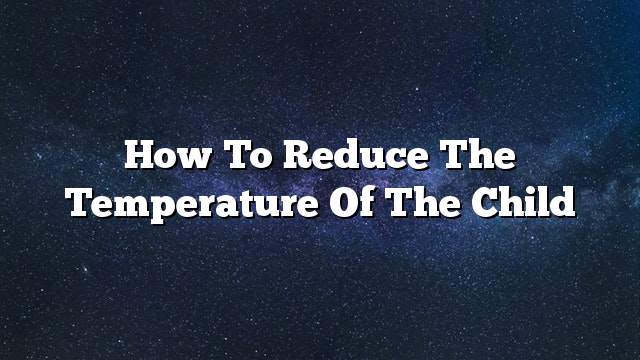High temperature in children
Warming is the most common problem among children. Most children experience a high temperature at some point in their lives, but in healthy children, normal height does not seem to be dangerous, although the warming of children may be scary, but Does not cause any harm, and can actually be a good thing. High temperature is the body’s way of defending itself against disease and infection, not any temperature rise that needs to be treated. However, a large temperature rise can irritate the child and cause problems such as dehydration.
The rise in temperature occurs when the body’s internal temperature control center raises the body temperature above normal levels. The center is located in the hypothalamus region of the lower middle part of the brain. The hypothalamus identifies the normal body temperature of 37 °, Signs to the body to maintain this degree, sometimes the body temperature may change during the day so that it is lower at the beginning of the day, and rises slightly in the evening, may change when the child is playing or running or even during exercise, Under the water The researchers believe that temperature rise is the body’s way of fighting the germs that cause disease and inflammation, as this height makes the body an uncomfortable place. For those microbes.
Ways to reduce the temperature of the child
- If the child is disturbed and uncomfortable because of fever, it is best to give him an antihypertensives, such as paracetamol or ibuprofen. If the parents do not know the recommended doses, or if the child is under 2, talk to your doctor for appropriate dosages . It is also forbidden to give babies under 2 months of age or children with medical problems to an antihypertensive medication without consulting a doctor. It is important to remember that these drugs temporarily reduce the heat and will not return them to normal levels, and you should know why the temperature and treatment.
- Children wear light clothing and are preferred to be covered with light clothing. Heavy clothing and blankets prevent the body from losing heat and can cause an increase in body temperature instead of lowering it.
- This method helps to reduce body temperature temporarily, and prevents the use of alcohol to reduce the temperature because it may cause poisoning if the skin penetrates and absorbed, and prevents the use of ice and cold water baths; because it may cause chills Which may raise body temperature.
- Provide plenty of fluids for the child, such as water or soup, to avoid dehydration; high temperature causes more fluid loss than usual. Caffeine-containing beverages such as soft drinks and tea should be avoided, as they may increase the baby’s urination and make the drought worse.
- Monitor the child by measuring his temperature using one of the different thermometers.
Causes of high temperature in children
The most common types of bacteria are the main cause of high temperature, common diseases caused by germs and causes of high fever: upper respiratory tract infections, influenza, ear infections, rosacea, tonsillitis, Urinary tract infections, and common diseases among children, such as chickenpox and pertussis. It is possible to raise the temperature of the child after vaccination, or when wearing heavy or thick clothing.
Cases that do not require contact with the doctor
Of the cases of high temperature of the child and do not need medical intervention as follows:
- High temperature duration of less than five days, the behavior of the child was relatively normal so that he eats, drinks and plays naturally, or it may seem more tired than usual.
- The child’s age is more than three months or less than three years, and the temperature does not exceed 39.1 °, or 39.4 °, and is older than that. This increase is often common among children, and may not necessarily be alarming.
- The child’s temperature rises slightly after vaccination for less than 48 hours.
Cases that require contact with the doctor
Of the cases of high temperature of the child, which is considered serious and need medical intervention as follows:
- High fever in infants younger than three months.
- If the temperature continues for more than five days.
- Child temperature exceeded 40 °.
- Do not decrease the temperature of the child after the use of antihypertensives.
- The behavior of the child has changed, and he has not been drinking enough fluids.
- Babies do not urinate at least four times a day, or older children do not urinate every 8-12 hours. This can lead to dehydration.
- High temperature of the child after vaccination to 38.9 °, or for more than 48 hours.
